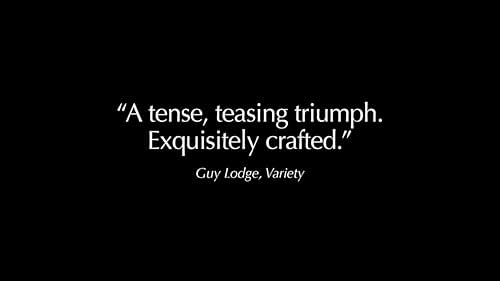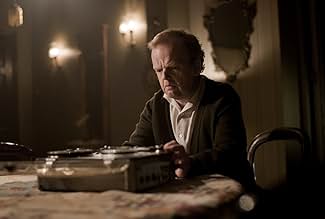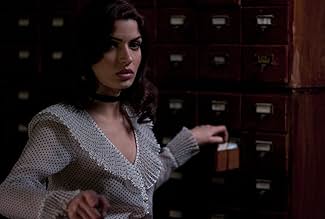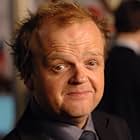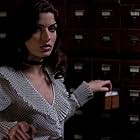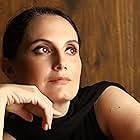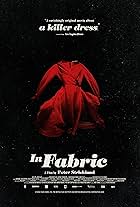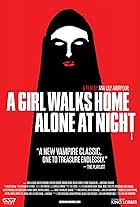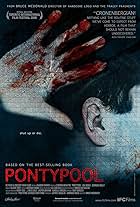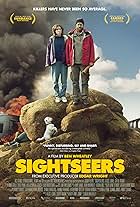A sound engineer's work for an Italian horror studio becomes a terrifying case of life imitating art.A sound engineer's work for an Italian horror studio becomes a terrifying case of life imitating art.A sound engineer's work for an Italian horror studio becomes a terrifying case of life imitating art.
- Awards
- 16 wins & 16 nominations
Jean-Michael van Schouwburg
- The Goblin
- (as Jean-Michel Van Schouwburg)
Miklos Kemecsi
- Gong and Philicorda
- (as Miklós Kemecsi)
- Director
- Writer
- All cast & crew
- Production, box office & more at IMDbPro
Storyline
Did you know
- TriviaThe title of the fictional studio refers to Cathy Berberian, the US soprano who married Luciano Berio, a pioneer of electronic music and a key influence on Strickland's film.
- GoofsAt the very beginning of the film, Elena calls Francesco to announce Gilderoy's arrival at the studio. Although the film is set in Italy, when she picks up the phone a continuous dial tone is heard, which is normal for the US or UK; however, the actual dial tone would have sounded very differently in Italy, a country where the phone system has a very distinctive and non-continuous dial tone (consisting of a 425Hz tone with a duration of 0.6sec followed by a 1 second pause, followed by a 0.2 sec tone then a 0.2 sec pause, repeated in a loop until the first digit is dialed).
- Quotes
Giancarlo Santini: Gilderoy, this is going to be a fantastic film. Brutal and honest. Nobody has seen this horror before.
- Crazy creditsThe opening credits are actually put together of those from The Equestrian Vortex, the fictional horror flick that's going to be post-dubbed in the movie, with fast-cut animations, medieval depictions of hell, demons, naves, animal skeletons and tortured female faces, mostly red and black colored.
- ConnectionsFeatured in MsMojo: Top 10 Scary Movies to Watch If You Hate Horror (2023)
Featured review
I'm a big fan of films where impressionable protagonists enter a world of images and fictions. The challenge is how to model madness, by what degrees to confuse and clarify. DePalma could do this type of film, fooling with layered placement and identity of the eye—it'd be as cool as this and obvious in its main thrust about madness, but probably not as ambient. Lynch could in a more powerful way.
The story is that a shy sound-man goes to work on an Italian exploitation movie, this is to establish him as a creative person who will have to imagine things, and to establish the things he's going to imagine as of some darkness. He is an introvert, so we can have this conflation of inner and outer sensitivity to phenomena. Funny: shy is here equated with unattractive appearance in the main actor.
The film is entirely contained on a soundstage and around the studio where the soundtrack is being prepared. The actual horror movie is never seen (except for the opening credits which serve as the credits to our film), always inferred from what we see of the sound-carpet being fitted, the screams and slashing sounds, and this is a crucial point: the horror movie never quite materializes, so there's widespread negativity in reviews.
Oh, we get obvious hallucination in the latter stages that I could do without, linked to movie screens as borders of reality — it clarifies too much. But there's something else I liked, simple and inventive.
All sorts of sound effects are constructed over the course of the film before our eyes, from ordinary means: melons are slashed, pumpkins are splattered, broth is boiling. The first time we see the effect being recorded, and then an off-screen voice announces what it is supposed to be the sound of, and it's done a second time. It's fun to see on a fundamental level as exposing the kind of unceremonious but inventive technical work that takes place behind cinematic curtains of illusion.
But more marvelous is exemplifying the mechanism of that illusion that creates the imagined horror story in our mind — the second time the sound becomes the mental image just described to us. By making it so immediate, it's a powerful exhibit, observable in your own self, of the mind acquiring illusory images — the images become what the off- screen voice announces. Wickedly clever! Because it puts us in the protagonist's shoes, by introducing a disruptive level of imagination.
So I think you must see this at one point. Based on his previous film and now this, I have this filmmaker on my short list of talent that I expect he has it in him to be a leading voice a decade from now.
The story is that a shy sound-man goes to work on an Italian exploitation movie, this is to establish him as a creative person who will have to imagine things, and to establish the things he's going to imagine as of some darkness. He is an introvert, so we can have this conflation of inner and outer sensitivity to phenomena. Funny: shy is here equated with unattractive appearance in the main actor.
The film is entirely contained on a soundstage and around the studio where the soundtrack is being prepared. The actual horror movie is never seen (except for the opening credits which serve as the credits to our film), always inferred from what we see of the sound-carpet being fitted, the screams and slashing sounds, and this is a crucial point: the horror movie never quite materializes, so there's widespread negativity in reviews.
Oh, we get obvious hallucination in the latter stages that I could do without, linked to movie screens as borders of reality — it clarifies too much. But there's something else I liked, simple and inventive.
All sorts of sound effects are constructed over the course of the film before our eyes, from ordinary means: melons are slashed, pumpkins are splattered, broth is boiling. The first time we see the effect being recorded, and then an off-screen voice announces what it is supposed to be the sound of, and it's done a second time. It's fun to see on a fundamental level as exposing the kind of unceremonious but inventive technical work that takes place behind cinematic curtains of illusion.
But more marvelous is exemplifying the mechanism of that illusion that creates the imagined horror story in our mind — the second time the sound becomes the mental image just described to us. By making it so immediate, it's a powerful exhibit, observable in your own self, of the mind acquiring illusory images — the images become what the off- screen voice announces. Wickedly clever! Because it puts us in the protagonist's shoes, by introducing a disruptive level of imagination.
So I think you must see this at one point. Based on his previous film and now this, I have this filmmaker on my short list of talent that I expect he has it in him to be a leading voice a decade from now.
- chaos-rampant
- Jun 29, 2013
- Permalink
- How long is Berberian Sound Studio?Powered by Alexa
Details
- Release date
- Countries of origin
- Official sites
- Languages
- Also known as
- Phòng Thu Hắc Ám
- Filming locations
- Production companies
- See more company credits at IMDbPro
Box office
- Gross US & Canada
- $38,493
- Opening weekend US & Canada
- $6,605
- Jun 16, 2013
- Gross worldwide
- $312,757
- Runtime1 hour 32 minutes
- Color
- Sound mix
- Aspect ratio
- 1.85 : 1
Contribute to this page
Suggest an edit or add missing content


